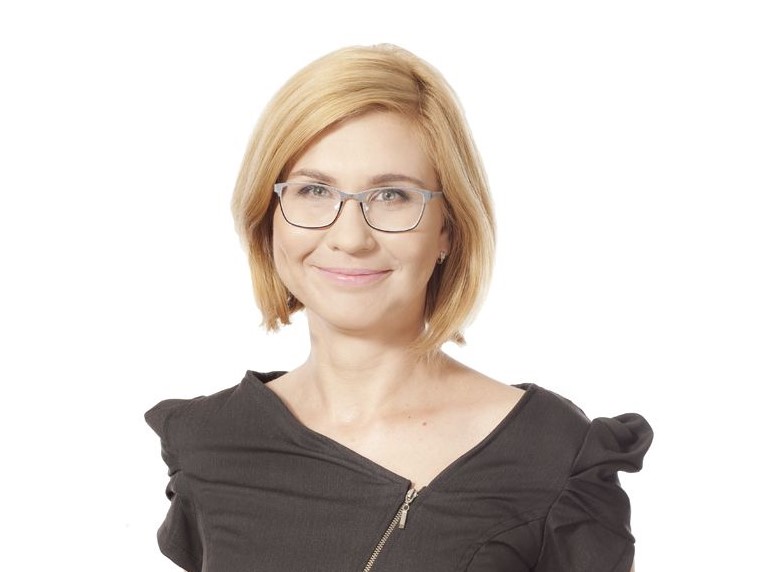LIDIA LEWANDOWSKA INTERVIEW

Lidia Lewandowska is an experienced and cosmetics-specialised journalist. She is the Editor in Chief of the Polish Virtual Cosmetics portal (Wirtualne Kosmetyki), a well-known Polish virtual platform fully dedicated to providing market insights on trends, consumer needs, and any other interesting topics for the cosmetics industry.
Besides her knowledge and ‘know-how’ – achieved thanks to a remarkable professional career on cosmetics journalism – her commitment to the sector goes beyond: Lidia created the Love Cosmetics Awards, and she actively participates on The More Beautiful Life Foundation.
Lidia, as an experienced journalist on the beauty market in Poland, you help all kind of enterprises that want to enter -or that already are settled- in the Polish market: producers, packaging or ingredient suppliers, etc. They all ground their developments on your articles and market insights. In a few words, how would you describe the Polish Beauty Market? How is it different from the Western-Europe market, for example?
Each market claims it’s different from the others but please believe me – the Polish beauty sector is truly unique. What makes it exceptional? Key distinguishing factor is an enormous competitiveness. Our consumers just love to have choice – and it’s not only about the brands but also about the manufacturers.
According to the data of the Central Statistical Office, we have over 1,000 cosmetics producers registered in Poland! Among them there are several multinationals, large domestic enterprises with many years of market experience and plenty of start-ups powered by new ideas and fresh energy. In addition, in recent years several small craft brands have been established, leveraging on developing trends on ecology, naturalness and locality.
Interestingly, the development of tiny companies goes in two parallel directions – some of them feel really good in their niche but there are numerous examples of small-scale operations that have been growing step by step, investing everything they earn in future development, both in Poland and abroad.
As in all business activities, the luck factor is very useful here (especially when you have so many competitors), but even more important in the long run are the idea for the brand, hard work and good communication with consumers.
What definitely distinguishes the Polish market at the moment is a very strong position of Polish players, especially in the face care category. Locality is not an empty slogan for us! #Polish Beauty is growing in strength all the time, setting a great example for other cosmetic markets. The bar is getting higher every year thanks to dedication of people, good marketing ideas, availability of natural ingredients and a good R&D base.
Wirtualne Kosmetyki also provides consulting projects. What would you say are your methods for projecting the trends forecasting the future of beauty in Poland? Could you tell us a few words of your forecasting for the next 2 years? What can we expect from the beauty sector?
Anyone who wants to be a good journalist, writer or consultant must learn how to listen appropriately, and I am a person who likes talking to people. At the same time, I don’t pretend to know everything about the world or the industry. There is a Polish saying that reflects this: “pride walks just before the fall”…
My judgment is based on close relationships with several market representatives. I like talking to practitioners, especially people running their businesses or being involved in the cosmetics sector as suppliers, trade owners or social media analysts. I ask them a lot of questions, sometimes even seemingly naive, but this allows me to build a broad perspective and take into account dozens of details. I look for recurring motives and common denominators in these various conversations – this only gives me the feeling that I know which direction the market is heading, what are the problems it is facing and what is worth paying special attention to. Research is of great importance to me. Confronting sales data, reading market analyzes, following consumers research – the more data I have, the more confident I feel!
When it comes to predicting trends: I would like to have a crystal ball… As Covid pandemics has demonstrated, sometimes unexpected events knock over all the bricks.
Nevertheless, there seem to be some common factors to be taken into account in Poland. Consumers definitely appreciate natural cosmetics more and more. At the same time, formulas of these products are becoming more complex, they are no longer just simple one-component products. I think that some brands will very consciously develop combining the best in nature with technological opportunities to increase effectiveness of products or their desired application properties.
Pro-health aspect will certainly be important. It will not only concern dermo-cosmetical products- those targeting sensitive or problematic skin- but also in daily care products. Such issues like care for the natural microbiome of the skin and strengthening its protective functions will be visibly growing.
The trend of “clean beauty” will evolve towards an even greater transparency. At the beginning, transparency was very only typical for natural cosmetics. Now, consumers’ expectation is very much focused on simplifying products, eliminating certain ingredients, and selecting the right of ingredients based on its whole pathway. On top of it, people are interested in the brand’s impact on the environment and local community. As you see, it is not only about the product itself but also brand values and authenticity.
The “instant beauty” approach also seems to be an important direction. In a world where everything happens so quickly, consumers expect the immediate benefits that a cosmetic can bring them. Besides, products cannot be boring, and the care itself should not be only a schematic daily routine. Cosmetics are meant to give a moment of respite, relaxation and pleasure. Polish consumers also like a certain element of surprise, non-obvious formulas or aromas that bring pleasant associations with the spa.
Speaking of a more advanced care, with the aging society (maybe not in the context of two years, but certainly the next two decades…), the demand for effective ‘anti-aging’ cosmetics will increase. Please bear in mind that currently we should rather talk about a pro-age approach and not an anti-age one! These cosmetics will probably be inspired by medical discoveries, epigenetics, and advanced aesthetic medicine treatments. Consumers want to look attractive and young. We won’t stop time, but we can definitely slow down some signs of aging thanks to good care.
In a nutshell, future of our market is all about change – the trends will evolve quickly but these mentioned above will certainly make a difference.
After having a look at the latest publications on Wirtualne Kosmetyki, one could think health situations such as the global pandemic are at the forefront right now. But there are also social situations, such as the feminist movement or environmental activism across the world, that are increasingly affecting the consumer behavior. One of the articles that really catch our attention talked about the effects on the industry of the ‘green washing’ that some corporations are using now. Could you please tell us a bit more about this? From your perspective, what are the differences between a company’s ‘green washing’ and a real green movement strategy? How can a company avoid falling into the ‘green washing’ trend, and set a real green strategy instead?
We have a huge group of conscious consumers in Poland. Critically minded people, not letting themselves get squeezed by every marketing rubbish.
Greenwashing is actually a rather complex topic, because there is still no definition of what a natural cosmetic is. There are definitions of various certifying companies and the ISO 16128 standard – this is probably what you can rely on the most.
As I already mentioned earlier on, many companies established in Poland a few years ago consciously decided to enter the natural niche. With time, however, these cosmetics became a real trend and large companies also joined the fight for consumers’ attention. And then the rumble began. The composition experts presented evidence that a green jar with a green leaf on the packaging is only a magnet for the consumer. Very often, the composition was not natural at all and there was a lot of so-called “unwanted ingredients” and “chemicals”. For conscious consumers, it was a simple scam, but let’s also remember that most people don’t have such discernment and knowledge. They may just be misled by all these names with the prefix “nature” or “eco” and the suggestive graphics on the packaging. At the same time, availability of these cosmetics grew in the largest retail chains, so they were just bestsellers in a wide distribution.
However, the aforementioned competitiveness of the market meant the beginning of change. Retailers recognized that many young brands were hugely popular. At the same time, they had to offer real natural products. Their social media had several real fans (not bots…). And if there was something in common between them is their consciousness and attentiveness. They were interested in cosmetics not superficially but with a lot of knowledge about the composition of the products. Internet popularity resulted in a booming sale of these brands.
New open-minded creators developed new, interesting products. Young generation of consumers abandoned the analog world and analog brands. It led to another change. Trade could not afford to disregard the phenomenon: growing popularity of certain brands and young consumers who seem to be more resistant to advertising and more attentive to topics such as brand & product composition, sustainability, localness. Initially, several selected local brands appeared on “trial” basis only. Today, most chains offer products of many young players, which makes the market even more fragmented. On the other hand, the entry into the shelves of truly natural products meant that many large companies had to “civilize” their own offer of natural cosmetics, so that their compositions did not raise any doubts, and the certificates became the guarantee of this.
Some consumers are convinced that what for young brands was their DNA and the founding stone, for big players was just following trends for profit. Now, the discussion concerns not only the composition, but also the impact of production on the environment: from individual ingredients to the final product, including packaging and – last but not least – supply chain.
The Internet also helps to clear the market from greenwashing. We have influencers who specialize in cosmetic reviews. Of course, some do it with a real knowledge of the subject, others pretend to be experts, sometimes unfortunately duplicating false theses or myths. It is not always easy for consumers to verify where they find real content and where it is manipulated. However, there are several sources where cosmetics are rated in a really honest manner and these Youtube channels, portals or Instagram profiles are now very popular. Therefore, it seems that both the competitiveness of the market and the Internet – with its whistleblowers – are finally reducing the scale of greenwashing.
I’m very happy of this change. It shows the power of the online community (which I’m part of) but most importantly, companies realized they had too much to lose. It led to quality growth and better market transparency.
We are experiencing what some call the Re-Awakening era, where consumers are being judged on their empathy and on their civic-minded attitude. Some brands have embraced the role of caretakers, supporting this new freedom wave, and allowing consumers to express themselves. Would you say that aspirational “superficial” perfection is out of the Polish consumer’s mind? How would you describe the future of beauty in Poland?
These are very important aspects that you paid attention to. We are talking at a time when the Women’s Strike is taking place in Poland – a social protest of Polish women against the radical restrictions in our country including strongly limited right to abortion.
It might seem that it has little to do with the cosmetics market… Well, on the contrary! First of all, these protests made many consumers aware that some brands, despite putting on their banners some slogans on supporting women, fell silent when a real women’s revolution came to the streets. On the other hand, several cosmetic companies expressed active support for women fighting for their rights. They were mainly young brands, founded by young people. Perhaps it was because of a true generational community, perhaps more authenticity in the declared values… Certainly, this situation should also be a reason to start looking at our consumers from a different perspective. They are not naive beauties thinking only about lipsticks and creams. Some girls wrote on their social media: “Why should I be happy about choosing mascaras, creams and lipsticks when I do not have the most important right to choose: to decide for myself?” In an industry where over 80% of consumers are women, it’s important to be sensitive to social trends and changes in order to understand who your final consumers are, and what is important to them.
Please remember that the Internet has completely changed our way of communication. There is no longer a one-way message: from brand to consumer. Now we have a real dialogue. Sometimes super benevolent, sometimes critical – and brands also need to be ready to face unfavorable comments.
These social changes also affect the advertising messages. The issues of self-acceptance, self-esteem, and a message more focused on “you can”, not “you must” are more and more emphasized in Poland too. The cosmetics industry is accused by feminist circles of making women feel complex for years and that is what it earned. That it used to encourage women to focus on what they looked like rather than what they had to say. Messages towards women were infantile and focused on the pressure of perfection.
Women felt they were being manipulated. They got irritated when they saw an advertisement for 50+ cream with a girl in her 30’s. They knew that the long eyelashes in the ad were due to Photoshop rather than the promoted product. Now you can finally feel a moment of relaxation. They can be themselves, as in the Dove advertisement, where we see different shapes, different skin colors. This brand really did a great job to make the pressure of ideality disappear from the communication of cosmetic brands.
Well, of course nothing can be too rosy. Many market studies show that Polish women are not satisfied with their appearance anyway (in general, we are extremely self-critical when compared to other nations). Young girls who spend a lot of time on social media endure the pressure of comparing themselves with others and prosecuting extremely badly. Unfortunately, top beauty brands continue to work with top influencers celebrities who work hard to look like a million dollars and monetize their own popularity…
Today, the challenge for many of us is to upload even one photo to the web without retouching or filtering. We feel constantly evaluated. For young girls, the number of likes can be an indicator of their own attractiveness. The body-positive trend that emerges in pain has to face criticism that promotes unhealthy attitudes. Yet it is not about promoting excess weight or encouraging women to give up taking care of themselves. The idea behind this movement is to free women from the corset of excessive expectations. Imposed by others, but also internally by themselves.
Cosmetic companies will have a growing impact on how Polish women perceive themselves. Their challenge is to promote beauty in an ethical way in advertising, social media and via the influencers they work with.
Let’s talk about one of the greatest of the consumer concerns: The claim natural. What does it mean for the Polish consumer? What do they expect in a product than claims to be natural? When looking for a natural cosmetic product, how much do you think the consumer values the naturality of its ingredients?
As I said, naturalness is super important to Polish consumers. They identify natural cosmetics as friendlier to the skin and the planet. Although, of course, the fact that the cosmetic is natural does not mean that it will not have an allergic effect on the skin, and each ingredient in the natural cream came from organic farming.
Certainly, informed consumers will always expect more. They understand naturalness broadly: from how the ingredients are obtained, what is the final composition of the product, what pro-ecological solutions are used by the manufacturer during the production process and what is the environmental impact of packaging. It is still a small part of consumers for now, but among the younger generation, these factors are of greater importance.
The attention of most consumers – apart from the attractiveness of the packaging and the creative name – is usually attracted by the main ingredient specified in the name of the series, e.g. bakuchiol, which has recently made such a career. For the last two years, we’ve also had a rash of cosmetics with “vege” in their brand name. It seems that certificates are less important for Polish consumers. Conscious consumers know that they are issued by organizations that make money on it. Some companies declare that they prefer to invest in further brand development than certification. And a wide group of consumers do not know what is behind a particular stamp anyway. This lack of knowledge was opening up space for greenwashing.
In the cosmetics business, trust in the brand counts the most. If the brand enjoys from its consumers’ trust, the manufacturer’s declaration is often enough. If the consumers have higher expectations and want to know more than what they read from the product packaging, they usually check on the Internet what the most popular composition reviewers say about one or another cosmetic. They check the opinions of other users who have already reached for a given product. The Internet encourages verification and sharing of opinions.
No comments yet
There are no comments on this post yet.





Leave a comment